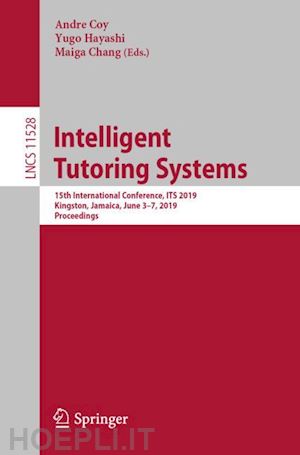
Questo prodotto usufruisce delle SPEDIZIONI GRATIS
selezionando l'opzione Corriere Veloce in fase di ordine.
Pagabile anche con Carta della cultura giovani e del merito, 18App Bonus Cultura e Carta del Docente
This book constitutes the proceedings of the 15th International Conference on Intelligent Tutoring Systems, ITS 2019, held in Kingston, Jamaica, in June 2019.
The 14 full papers and 13 short papers presented in this volume were carefully reviewed and selected from 42 submissions. In the back matter of the volume 4 poster papers are included. They deal with the use of advanced computer technologies and interdisciplinary research for enabling, supporting, and enhancing human learning.
A Learning Early-warning Model Based on Knowledge Points.- Adaptive Learning Spaces with Context-Awareness.- Agents’ Cognitive vs. Socio-affective Support in Response to Learner’s Confusion.- An Adaptive Approach to Provide Feedback for Students in Programming Problem Solving.- Analysis and Prediction of Student Emotions While Doing Programming Exercises.- Analyzing Best Hints for a Programming IST.- Analyzing the Group Formation Process in Intelligent Tutoring Systems.- Analyzing the usage of the classical ITS software architecture and refining it.- Assessing Students’ Clinical Reasoning using Gaze and EEG Features.- Computer-Aided Intervention for Reading Comprehension Disabilities.- Conceptualization of IMS that Estimates Learners’ Mental States from Learners’ Physiological Information Using Deep Neural Network Algorithm.- Data-Driven Student Clusters Based on Online Learning Behavior in a Flipped Classroom with an Intelligent Tutoring System.- Decision Support for an AdversarialGame Environment using Automatic Hint Generation.- Detecting Collaborative Learning through Emotions: An Investigation using Facial Expression Recognition.- Fact Checking Misinformation Using Recommendations from Emotional Pedagogical Agents.- Intelligent On-line Exam Management and Evaluation System.- Learning by Arguing in Argument-Based Machine Learning Framework.- Model for data analysis process and its relationship to the hypothesis-driven and data-driven research approaches.- On the discovery of educational patterns using biclustering.- Parent-Child Interaction in Children's Learning How to Use a New Application.- Patterns of Collaboration Dialogue Acts in Typed-Chat Group Problem-Solving.- PKULAE: A Learning Attitude Evaluation Method Based on Learning Behavior.- Predicting MOOCs Dropout Using only two easily obtainable Features from the First Week’s Activities.- Predicting subjective enjoyment of aspects of a videogame from psychophysiological measures of arousal and valence.-Providing the Option to Skip Feedback – A Reproducibility Study.- Reducing Annotation Effort in Automatic Essay Evaluation Using Locality Sensitive Hashing.- Representing and Evaluating Strategies for Solving Parsons Puzzles.- Testing the Robustness of Inquiry Practices once Scaffolding is Removed.- Toward Real-Time System Adaptation using Excitement Detection from Eye Tracking.- Towards Predicting Attention And Workload During Math Problem Solving.- Using a Simulator to Choose the Best Hints in a Reinforcement Learning-Based Multimodal ITS.











Il sito utilizza cookie ed altri strumenti di tracciamento che raccolgono informazioni dal dispositivo dell’utente. Oltre ai cookie tecnici ed analitici aggregati, strettamente necessari per il funzionamento di questo sito web, previo consenso dell’utente possono essere installati cookie di profilazione e marketing e cookie dei social media. Cliccando su “Accetto tutti i cookie” saranno attivate tutte le categorie di cookie. Per accettare solo deterninate categorie di cookie, cliccare invece su “Impostazioni cookie”. Chiudendo il banner o continuando a navigare saranno installati solo cookie tecnici. Per maggiori dettagli, consultare la Cookie Policy.